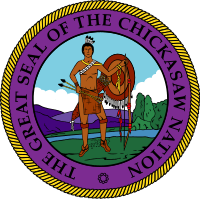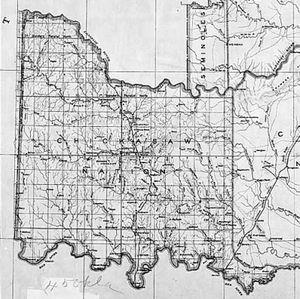Chickasaw Nation
 Great Seal | |
| Total population | |
|---|---|
| 66,000[1] | |
| Regions with significant populations | |
|
| |
| Languages | |
| English, Chickasaw language | |
| Religion | |
| Traditional tribal religion, Protestantism (Baptist, Methodist)[2] | |
| Related ethnic groups | |
| Choctaw |
The Chickasaw Nation is a federally recognized Native American nation, located in Oklahoma. They are one of the members of the Five Civilized Tribes. The Chickasaw Nation traces its origins to its Homeland of modern day Mississippi, Tennessee, Alabama and Kentucky.
History
Hernando de Soto is credited as being the first European to contact the Chickasaw, during his travels of 1540. He discovered them to have an agrarian society with a sophisticated governmental system, complete with their own laws and religion. They lived in towns. [3]
In 1797, a general appraisal of the tribe and its territorial bounds was made by Abraham Bishop of New Haven, who wrote:
| “ | The Chickasaws are a nation of Indians who inhabit the country on the east side of the Mississippi, on the head branches of the Tombeckbe (sic), Mobille (sic) and Yazoo rivers. Their country is an extensive plain, tolerably well watered from springs, and a pretty good soil. They have seven towns, and their number of fighting men is estimated at 575.[4] | ” |
The Chickasaw remained in their Homeland of western Kentucky, western Tennessee, northern Mississippi and northwest Alabama until the 1830s. After decades of increasing pressure to cede their land from the federal and state governments, the Chickasaw finally agreed to cede their remaining Mississippi Homeland in the Treaty of Pontotoc Creek and relocate west to Indian Territory.

During Indian removal of the 1830s, the Chickasaws and Choctaws signed the Treaty of Doaksville, in which the Chickasaws purchased the western lands of the Choctaw Nation in Indian Territory. Their area in the western area of the nation was called the Chickasaw District. It consisted of Panola, Wichita, Caddo, and Perry counties.
Although originally the western boundary of the Choctaw Nation extended to the 100th meridian, virtually no Chickasaw lived west of the Cross Timbers, due to continual raiding by the Plains Indians of the southern region. The United States eventually leased the area between the 100th and 98th meridians for the use of the Plains tribes. The area was referred to as the "Leased District".".[5]
The division of the Choctaw Nation was ratified by the Choctaw–Chickasaw Treaty of 1854. The Chickasaw constitution establishing the nation as separate from the Choctaws, was signed August 30, 1856, in the new capitol of Tishomingo (now Tishomingo, Oklahoma). The first Chickasaw governor was Cyrus Harris. The nation consisted of five divisions; Tishomingo County, Pontotoc County, Pickens County, and Ponola County. Law enforcement was provided by the Chickasaw Lighthorsemen, although non-Indians fell under the jurisdiction of the Federal court at Fort Smith.
Following the Civil War, the United States forced the Chickasaw Nation into a new peace treaty due to their support for the Confederacy. Under the new treaty, the Chickasaw (and Choctaw) ceded the "Leased District" to the United States.
The role of tribal governments in Indian Territory came to an end in 1907 when Oklahoma entered the union as the 46th state. As a result, Chickasaws were granted United States citizenship. From that point until 1971, the president of the United States appointed the representative of the Chickasaw Nation. Douglas H. Johnston was the first man to serve in this capacity. Governor Johnston served the Chickasaw Nation from 1906 until his death in 1939 at age 83.
During a time that civil rights issues gripped the rest of the country, a group of Chickasaws met at Seeley Chapel, a small country church near Connerville, Oklahoma, to work toward the reestablishment of its government. After the passing of Public Law 91-495, tribal government was finally realized. In 1971, the first tribal election since 1904 was held, resulting in Overton James’ landslide victory as governor of the Chickasaw Nation.
Since the 1980s, tribal government has focused most of its efforts on building an economically diverse base to generate funds that will support programs and services to Indian people.
Government and politics
The Chickasaw Nation is headquartered in Ada, Oklahoma. Their tribal jurisdictional area is in Bryan, Carter, Coal, Garvin, Grady, Jefferson, Johnston, Love, McClain, Marshall, Murray, Pontotoc, and Stephens counties in Oklahoma. Their tribal governor is Bill Anoatubby.[1]
The Chickasaw Nation’s current three-department system of government was reestablished with the ratification of the 1983 Chickasaw Nation Constitution. The elected officials provided for in the Constitution believe in a unified commitment, whereby government policy serves the common good of all Chickasaw citizens. This common good extends to future generations as well as today’s citizens. The structure of the current government encourages and supports infrastructure for strong business ventures and an advanced tribal economy. The use of new technologies and dynamic business strategies in a global market are also encouraged.
Monies generated in business are divided between investments for further diversification of enterprises and support of tribal government operations, programs and services for Indian people. This unique system is key to the Chickasaw Nation’s efforts to pursue self-sufficiency and self-determination, which helps ensure that Chickasaws stay a united and thriving people.
Revenues generated by Chickasaw Nation tribal business endeavors fund more than 200 programs and services. These programs cover education, health care, youth, aging, housing and more, all of which directly benefit Chickasaw families, Oklahomans and their communities.
Governor Bill Anoatubby appointed Charles W. Blackwell as the Chickasaw Nation's first Ambassador to the United States in 1995.[6] (Blackwell had previously served as the Chickasaw delegate to the United States from 1990 to 1995).[6] At the time of his appointment in 1995, Blackwell became the first Native American tribal ambassador to the United States government.[6] Blackwell served in Washington as ambassador from 1995 until his death on January 3, 2013.[6] Governor Bill Anoatubby named Neal McCaleb ambassador at large in 2013, a role similar to that of the late Charles Blackwell.
Economy
The Chickasaw Nation operates more than 100 diversified businesses in a variety of services and industries, including manufacturing, energy, health care, media, technology, hospitality, retail and tourism. It also owns and operates Bedré Fine Chocolate in Davis, Lazer Zone Family Fun Center and the McSwain Theatre in Ada; The Artesian Hotel in Sulphur; Chickasaw Nation Industries in Norman, Oklahoma; Global Gaming Solutions, LLC; KADA (AM), KADA-FM, KCNP, KTLS, KXFC, and KYKC radio stations in Ada; and Treasure Valley Inn and Suites in Davis. Their estimated annual tribal economic impact is over $3.18 billion.[1] In addition, the Chickasaw Nation operates historical sites and museums including the Chickasaw Cultural Center, Chickasaw Nation Capitols, and Kullihoma Grounds.
Their casinos include Ada Gaming Center, Artesian Casino, Black Gold Casino, Border Casino, Chisholm Trail Casino, Gold Mountain Casino, Goldsby Gaming Center, Jet Stream Casino, Madill Gaming Center, Newcastle Casino, RiverStar Casino, Riverwind Casino, Treasure Valley Casino, Texoma Casino, SaltCreek Casino, Washita Casino and WinStar World Casino. They also own Lone Star Park in Grand Prairie, Texas and Remington Park Casino in Oklahoma City.
Notable people
- Bill Anoatubby, Governor of the Chickasaw Nation since 1987
- Jodi Byrd, Literary and political theorist
- Jack Brisco and Gerry Brisco, pro-wrestling tag team
- Jeff Carpenter, Recording artist and co-founder of the Native American music group Injunuity
- Edwin Carewe (1883–1940), movie actor and director[7]
- Charles David Carter, Democratic U. S. Congressman from Oklahoma[8]
- Travis Childers, U.S. Congressman from Mississippi
- Tom Cole, Republican US Congressman from Oklahoma
- Hiawatha Estes, architect
- Cyrus Harris, first Governor of the Chickasaw nation
- John Herrington, astronaut; first enrolled Native American to travel in space
- Linda Hogan, author, writer-in-residence of the Chickasaw Nation
- Overton James, Governor of the Chickasaw Nation (1963-1987)
- Douglas H. Johnston, Governor of Chickasaw Nation 1898-1902 and 1904-1939
- Neal McCaleb, civil engineer and politician
- Bryce Petty, quarterback for the Miami Dolphins
- Eula Pearl Carter Scott, at one time the youngest pilot in the United States; later one of the Chickasaw Nation’s first community health representatives and later elected to the Chickasaw legislature where she served three terms[9][10]
- Jerod Impichchaachaaha' Tate, composer and pianist
- Oliver Lee Pearson, business consultant, inventor, and investor
- Rebecca Sandefur, sociologist and winner of a MacArthur "Genius" Fellowship
- Mary Frances Thompson, also known as Te Ata Fisher, storyteller and actress[11]
- Fred Waite (1853 - 1895), politician representative, senator, Speaker of the House and Attorney General of Chickasaw Nation
- Estelle Chisholm Ward, first woman to represent tribal interests to Washington, D.C.
- Luke Swinney, notable television producer
- Kevin K. Washburn, federal government official and law professor
Notes
- 1 2 3 2011 Oklahoma Indian Nations Pocket Pictorial Directory. Archived May 12, 2012, at the Wayback Machine. Oklahoma Indian Affairs Commission. 2011: 8. Retrieved January 2, 2012.
- ↑ Pritzker, 373
- ↑ Official Site of the Chikasaws. Retrieved December 26, 2012
- ↑ Bishop, Abraham. "Georgia Speculation Unveiled". University Microfilms 1966. Missing or empty
|url=(help) - ↑ Arrell Morgan Gibson (1981). "The Federal Government in Oklahoma". Oklahoma: A History of Five Centuries. University of Oklahoma Press. p. 112. ISBN 0-8061-1758-3.
- 1 2 3 4 "Chickasaw Nation Ambassador Charles W. Blackwell – a Man of Vision". KXII. January 4, 2013. Archived from the original on January 8, 2013. Retrieved January 20, 2013.
- ↑ "Native American Data for Jay J Fox". RootsWeb. Retrieved 10 June 2015.
- ↑ "Carter, Charles David (1868–1929)." Oklahoma Historical Society's Encyclopedia of Oklahoma History and Culture. Retrieved 6 May 2012.
- ↑ "Chickasaw Nation Hall of Fame - Eula Pearl Carter Scott". Hof.chickasaw.net. Retrieved 2015-11-09.
- ↑ oklahoma state senate staff. "Oklahoma State Senate - News". Oksenate.gov. Retrieved 2015-11-09.
- ↑ TE ATA (1895-1995)
References
- Pritzker, Barry M. A Native American Encyclopedia: History, Culture, and Peoples. Oxford: Oxford University Press, 2000. ISBN 978-0-19-513877-1.
Further reading
- Johnson, Neil R.; C. Neil Kingsley (editor). The Chickasaw Rancher. Boulder: University Press of Colorado, 2001 (Revision of 1960 edition). ISBN 978-0-87081-635-2
- Kappler, Charles (ed.). "TREATY WITH THE CHOCTAW AND CHICKASAW, 1854". Indian Affairs: Laws and Treaties. Washington: Government Printing Office, 1904. 2:652-653 (accessed December 25, 2006).
- Kappler, Charles (ed.). "TREATY WITH THE CHOCTAW AND CHICKASAW, 1866". Indian Affairs: Laws and Treaties. Washington: Government Printing Office, 1904. 2:918-931. (accessed December 27, 2006).
- Wright, Muriel H. "Organization of the Counties in the Choctaw and Chickasaw Nations". Chronicles of Oklahoma 8:3 (September 1930) 315-334. (accessed December 26, 2006).
External links
- Chickasaw Nation, official website
- Chickasaw Nation Video Network - Chickasaw.TV
- Voices of Oklahoma interview with Bill Anoatubby. First person interview conducted on October 18, 2010 with Bill Anoatubby, the tribal Governor of the Chickasaw Nation.